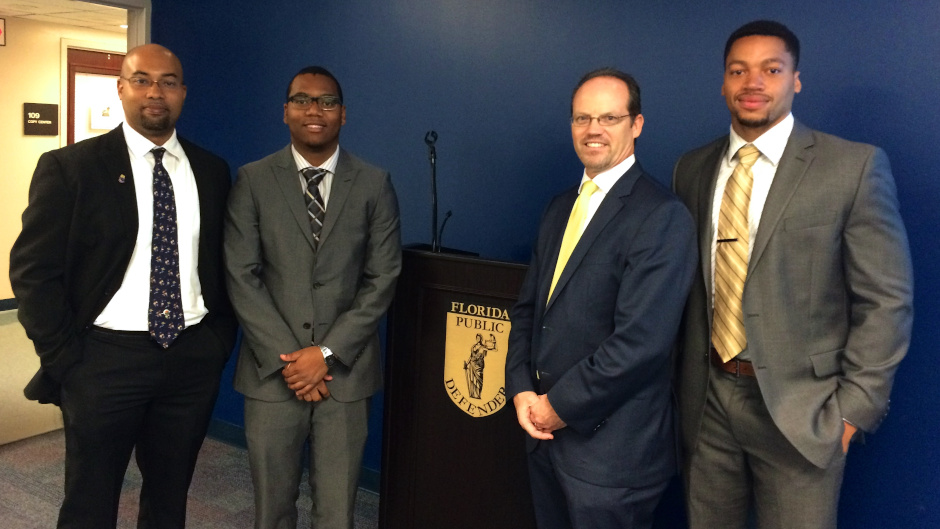Each semester the Professional Responsibility & Ethics Program (PREP) includes among its diverse audiences those attorneys who work in the public sector. This spring, under the guidance of PREP director Jan L. Jacobowitz, PREP students developed CLE Legal Ethics seminars for both the County Attorney’s Office and the Public Defender’s Office. The opportunity to research the legal ethics challenges germane to government defense attorneys in both the civil and criminal contexts was enlightening for the students as well as the attorneys to whom they presented.
At the Miami-Dade County Attorney’s Office, PREP fellow Dalisi Otero, 3L, along with PREP interns Ivana Alvarez, 3L and Ellen Kruk, 2L, presented on cutting edge legal ethics topics, including strategies for effective social media discovery, motions to compel discovery, authenticating and admitting social media evidence, and investigating jurors on social media.
Alvarez, who presented strategies for effective social media discovery, remarked that the training “truly illustrated how valuable these presentations are for PREP students. Not only did I learn—from practicing attorneys—about realistic attorney conduct during discovery, but I was also called upon to think quickly and opine on how recent changes in legal ethics might apply to different scenarios. The attending attorneys posed thought-provoking hypotheticals that challenged me to apply my knowledge of recent changes in the legal ethics involved in social media advice and discovery. They were incredibly interactive and engaged in the discussion; many shared their professional experience on how these topics typically play out in practice.”
Kruk presented on the issue of authenticating and admitting social media evidence. “The prevalence of social media today presents new evidentiary challenges for attorneys: it raises concerns with the authenticity and relevance of such evidence and creates hurdles to admissibility,” she said.
“It was an honor and a privilege to present at the County Attorney’s Office again this year and to work on a training with Jan, Ivana, and Ellen,” said Otero, who presented on the ethical implications of attorneys investigating jurors on social media.
“When I started law school, I never imaged that as a student I would be able to interact with the legal community as much as I have through PREP, much less present CLE ethics trainings to practicing attorneys who are truly interested in discussing the issues that we present. The attending attorneys were involved and engaged not only because the topics were relevant and interesting, but also because the attorneys are encountering these issues in their daily practices. We also had the unique opportunity to speak with attorneys after the presentation, and they shared helpful advice with us that they had learned throughout their careers.”
Fellow Samuel Bookhardt IV is another student who has learned new issues with every presentation. Interns Wilford Harris and Justin Boyd joined Bookhardt to visit the Miami-Dade Public Defender’s Office for a legal ethics training that addressed some of the possible landmines attorneys may encounter when dealing with clients, witnesses, opposing counsel and social media. The training was delivered using three hypotheticals as the topics for discussion.
The first hypothetical discussed both working with clients who have a negative opinion of all government lawyers and the proper way to handle unprofessionalism of opposing counsel. “The attorneys related to both of the issues and shared their experiences, which made the discussion extremely interesting,” said Boyd.
Bookhardt discussed the ethical implications involved with changing privacy settings and removing photographs on social media. “The attorneys were very lively,” said Bookhardt. “Their comments and interaction made this presentation a great experience. Social media is clearly a hot topic right now. The law is ever evolving and attorneys are challenged to adapt to the constant changes in the practice of law.”
The third hypothetical focused on issues of confidentiality with regard to client’s rights and jurors on social media. “From the beginning of the semester, working on the Public Defender’s Office training was a priority for me,” said Harris. “I have worked as an intern there and I knew that the lawyers would provide an enlightening perspective on these issues. I was not disappointed.”
PREP is an award-winning program, which develops continuing legal education (CLE) ethics training for the legal community. The program combines the attributes of an ethics institute and an ethics clinic, has dedicated hundreds of student hours to public service, and has educated thousands of members of the Bench & Bar. In 2012, PREP was recognized by the ABA with its E. Smythe Gambrell Professionalism Award —the leading national award recognizing programs and projects contributing to the understanding and advancement of professionalism among lawyers and judges. In addition to presenting ethics trainings, throughout the semester PREP students publish blog posts regarding the nation’s newest ethics opinions. The blog, Legal Ethics in Motion, can be found here.

